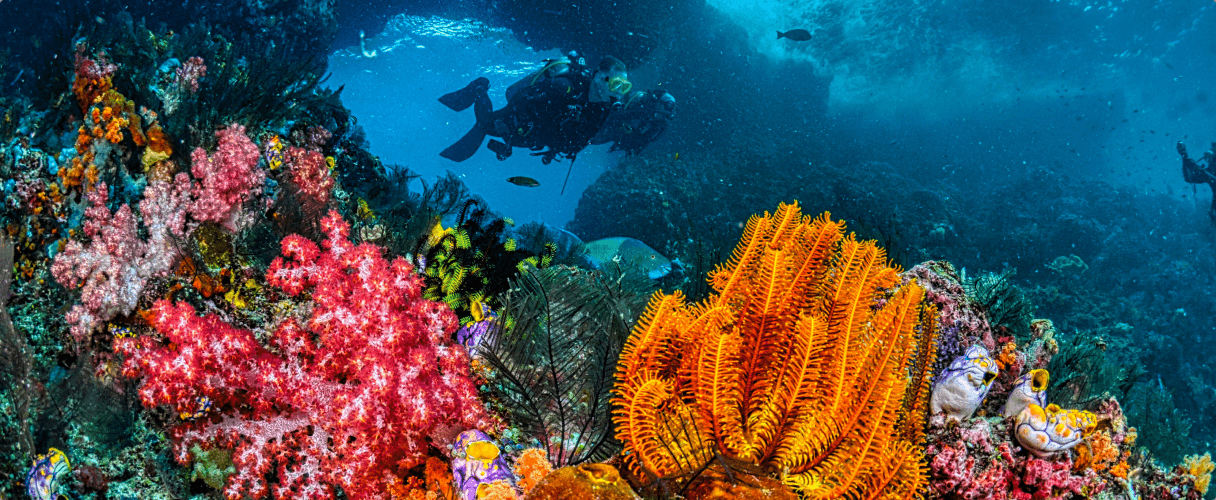Repair
Exploring Pathways to Prolong the Health of Critical Marine Ecosystems and Avert Dangerous Climate Tipping Points
People around the globe are observing rapid and dramatic changes in the oceans and cryosphere, as increasing concentrations of heat-trapping greenhouse gas pollution in the atmosphere drive increased atmosphere and ocean temperatures, as well as changes in ocean chemistry. These in turn have caused a ripple of alarming effects, from widespread coral reef loss to changes in ocean circulation to a rapidly diminishing cryosphere, which plays a pivotal role in ocean-climate regulation. Given the enormity of these risks, Ocean Visions believes it is necessary to responsibly investigate all possible ideas that may be able to help forestall dangerous losses and transformations of critical marine ecosystems, while society continues work to reduce and remove greenhouse gas pollution as the permanent long-term solution.
Marine Ecosystem Health
The current rate of marine ecosystem damage is staggering and continues to increase. 50 percent of Earth’s coral reefs have been lost since 1950, and Arctic summer sea ice extent is declining by 13 percent per decade, since satellite tracking first began 40 years ago.
Many scientists warn that some marine ecosystems and cryosphere elements are reaching dangerous tipping points that would lead to irreversible changes in these critical and complex ecosystems, and trigger additional climate feedback loops that further fuel such changes.
The only durable way to slow, and ultimately reverse, these climate change-driven threats is by reducing atmospheric concentrations of greenhouse gases, through decarbonization (i.e., reductions of greenhouse gas emissions) and carbon dioxide pollution cleanup.
Unfortunately, the best available science on climate risk indicates that, given the current and projected levels of human-caused greenhouse gas pollution, even combined rapid decarbonization and carbon dioxide removal are unlikely to cool the planet in time to prevent dramatic and sustained ecosystem shifts that would perpetuate further climate disruption and destabilization.
Given the enormity of these risks, Ocean Visions believes it is necessary to responsibly investigate all possible ideas that may be able to help forestall dangerous losses and transformations of critical marine ecosystems, while society continues work to reduce and remove greenhouse gas pollution as the permanent long-term solution.

50 percent of Earth’s coral reefs have been lost since 1950, and Arctic summer sea ice extent is declining by 13 percent per decade, since satellite tracking first began 40 years ago.
What We're Doing
In 2023 Ocean Visions launched a new program to systematically identify and assess a full range of potential ideas to prolong and reinforce the function of critical components of the ocean-climate system. The first ecosystem Ocean Visions is focusing on is Arctic sea ice, which is a critical component of the global climate system because of its contribution to the Earth’s reflectivity (albedo) and potential to influence global weather patterns. In addition, the Arctic environment is already warming up more quickly than the rest of the world.
A recent rapid response assessment by UArctic, a network of over 100 universities and research institutes concerned with the Arctic, summarized sixty-one potential ideas that could reinforce the function of Arctic ice, which include (but are not limited to):
- Marine cloud brightening: Small particles from seawater would be sprayed into the air, seeding low-lying clouds. This would enhance the albedo of ocean clouds by increasing their amount, lifetime, and reflectivity. Modeling studies have shown that MCB could significantly cool the Arctic, but field research is needed to understand other potential environmental effects.
- Sea ice thickening: Slowing or reversing the decline of Arctic sea ice by artificially thickening it – for example, by pumping sea water on top of existing ice and letting it freeze. Researchers have suggested that floating pumps powered by renewable energy could be used, although many questions remain about design and how to produce, distribute, and maintain such devices.
- Black carbon reduction: Targeted reductions in black carbon (soot), which darkens ice surfaces and decreases reflectivity. This could happen through shipping regulations, fuel bans, and other measures. Research is needed to assess effectiveness and indirect effects, such as heating from reduction of other aerosols associated with shipping.
Ocean Visions is not advocating for the deployment of these ideas.
There are outstanding questions and uncertainties about all of these ideas that must be answered. However, we believe it is sound policy and risk management to responsibly explore all potential avenues to avoid irreversible damage to marine ecosystems or to avoid surpassing critical climate tipping points.As we face increasing levels of climate risk, we need the data that allows us to fully assess the impacts and risks of each proposal, identify what further research and testing is needed to evaluate them, and decide at which point they are either not viable, or that they should move forward (e.g., see the framework of research “exit ramps” proposed by Diamond et al. (2022) on marine cloud brightening). This research must be done with transparency, including a high degree of engagement with affected communities, so that it can be assessed within the public domain.
Recognizing that people – including policy makers and scientists – have made mistakes when intervening with complex ecosystems, and have not brought all stakeholders to the table on climate change, this new field of inquiry must include the involvement of many scientific disciplines, sectors, communities, perspectives, and sources of knowledge. Research must also prioritize matters of safety (for both human and natural communities) and international governance.
Our work on prolonging the health of marine ecosystems is guided by these facts and principles.

Given the enormity of the risk, Ocean Visions believes it is necessary to responsibly investigate all possible ideas that may be able to help forestall dangerous losses and transformations of critical marine ecosystems, while society continues work to reduce and remove greenhouse gas pollution as the permanent long-term solution.
Current Work
Ocean Visions developed a digital, interactive ‘road map’ assessing tools and strategies that may be able to slow the loss of and rebuild Arctic sea ice. This will be the latest in the suite of Ocean Visions road maps on ocean-based climate solutions.
The map reviews the current state and potential of 21 approaches to slow the loss of Arctic sea ice, analyzes social and environmental risks and co-benefits, identifies key governance issues, and the knowledge gaps that need to be filled to fully evaluate the tools and interventions. The map also identifies a set of first-order priorities for additional research, development, and potential testing.
An international Advisory Board comprised of 11 individuals from six countries helped guide Ocean Vision’s road map. The Advisory Board met regularly to help Ocean Visions develop the content of the road map, identify critical areas of inquiry, and to ensure that the road map is inclusive of considerations specific to the Arctic region and its communities. Their perspectives and expertise span different disciplines, backgrounds, and experiences. In addition, Ocean Visions connected with more than 100 individuals and organizations from 13 different countries throughout the development of the road map content.
The road map is a living document that will be continuously updated as new information becomes available. For those interested in engaging, we invite comment or content submissions on the road map.
Ocean Visions is now working to mobilize action on a subset of the first-order priorities identified in the road map.


